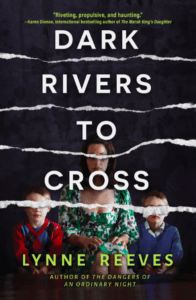Lynne Reeves: I’ve always been fascinated by the reasons people give for not sharing their innermost feelings with the people they love most. In a way, all of my fiction explores why we think we’re protecting ourselves and other people by keeping the truth hidden. I think we do this because we haven’t been taught effective ways to talk about difficult emotional matters. It’s hard to be vulnerable with other people.
Sometimes impossible to share painful feelings and dark emotions.
I haven’t always written domestic suspense novels. At the core of all of my work are family stories. It’s just that the world has become more complex, more chaotic. Therefore, the stakes and tension in my work has increased. The challenges we face are more complicated, more nuanced. I hope my novels help people talk more to each other about what preoccupies us, what troubles us, and how we want to be loved.
 AW: Luke and Jonah are opposites. How did their characters begin to speak to you? Did they come into your mind fully formed, or did they evolve as you wrote?
AW: Luke and Jonah are opposites. How did their characters begin to speak to you? Did they come into your mind fully formed, or did they evolve as you wrote?
LR: My novels always come to me through character first. For Dark Rivers to Cross I knew there would be two adopted siblings who would struggle with knowing their origin story. Ever focused on getting conflict on the page, I saw the tension in one character needing to know the details and one not wanting to know. In order to move the narrative forward, I also knew that Luke would love living in nature, being fed by his natural environment, while Jonah would struggle with where he lives, increasingly preoccupied with finding out where he came from. It was the perfect setup for a quest for the truth, with one eager to find out about life before Church’s Overlook and one reluctant to.
AW: How did your school and family counselor background help you understand what Lena’s sons might be experiencing emotionally as their mother tried to hide their true beginnings from them?
LR: Everything about my family counselor background informs my fiction. Over the years, it’s been interesting to me to see how some people want to know the details of their parents’ lives. Where are they came from? What motivated them to do the things they’ve done?
Adoption is one of many issues that impact identity formation, and some people want to know their birth parents and what decisions were made on their behalf. While others remain uninterested, content with the life they are living. Of course, many are torn.
My job as a counselor is to listen. It’s my aim to let people come to the conclusion that’s right for them. In writing fiction, I have the privilege of exploring how characters or families grapple with these delicate issues. Without being prescriptive, I can let the story unfold, allowing readers to come to their own conclusion about what they might do in similar circumstances.
AW: What’s your secret for doling out enough information so your readers don’t get aggravated but not so much that they lose interest?
LR: It’s a delicate balance to find the sweet spot between withholding too much and revealing information too fast. To keep a novel with high stakes moving forward, I don’t always get it right in the first draft, or even the second. It’s the goal of revision to make sure that I do get it just right. I want the reader to be eager to read ahead to the climax, and when they get there, feel that the ending is as surprising as it is inevitable.
AW: Your novel is set in a beautiful remote area of Maine. Have you been there? What made you choose this setting?
LR: For many years, my family has vacationed in Maine. Living in New England, I appreciate each of the states for their own landscape. The rugged North wilderness is a perfect place to set a novel and it was great fun to research the area and visit it repeatedly. My fictional river lodge, the Penobscot River, and the Maine Woods feature prominently in the conflict, setting Lena, Luke, and Jonah in a place where we get to see what they are made of. The remoteness adds to the atmosphere and intrigue, and hopefully, it provides the reader with an immersive experience. For me, it vicariously allowed me to travel to an area I love.
Lynne is a member of International Thriller Writers, Mystery Writers of America, Sisters in Crime National and Sisters in Crime New England. Visit her website: www.lynnegriffin.com, Instagram: @lynnereevesgriffin, Twitter: @Lynne_Griffin.


